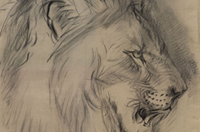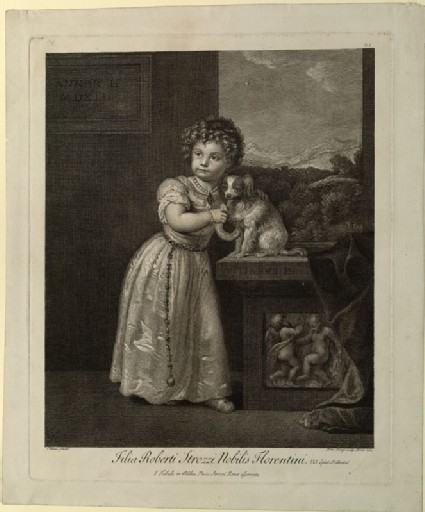Ruskin's Standard & Reference series (1872)
Exemplary works of art. In the catalogue of the Reference series, items marked 'M' are drawings "by my own Hand" (by Ruskin), P are photographs, E engravings and A by Ruskin's Assistant, Arthur Burgess.

Ruskin's Catalogues: 1 object
Show search help- Reference URL
Actions
Engraving of Titian's "Portrait of Clarissa Strozzi" Domenico Cunego
-
Ruskin text
a little lady of the Strozzi family , by Titian. -
Curator’s description:
Description
Clarissa Strozzi is portrayed as a little girl, aged two, leaning over towards the the little dog which sits on the pedestal to her right.
Cook and Wedderburn (XXI.26 n. 3) identify the engraving's subject as 'Titian's portrait of the little daughter of Roberto Strozzi, playing with a dog; the picture is now in the Berlin Gallery': that is, the painting created by Titian in 1542, now in the Gemäldegalerie in Berlin. Titian's original picture had been added to by the time the engraving was made: a strip along the right edge, as wide the piece of wall painted upon it; and a strip along the bottom edge, as wide as the distance between the edge and the bottom of the drapery, which originally ran up to the edge of the picture.
The print was first listed in the Teaching Collection in 1870, when it was included in the "Catalogue of Examples" as the upper picture in frame 42 of the Reference Series, placed above a photograph of a copy of a van Dyck portrait of James, Duke of York. Both pictures retained their position in the 1872 catalogue of the series. The print formed part of a sequence of pictures by painters - all portrait-painters - who applied paint broadly, using the edges of the painted areas to denote outlines, rather than drawing them in with the point of the brush (Catalogue of Examples, p. 19). In "The Eagle's Nest" (§ 151 = XXII.223-225), Ruskin compared it to a print after Reynolds's "Portrait of Princess Matilda Sophia" (no. 125 in the Rudimentary Series) - considering the Reynolds 'much more delightful'. They stood there as examples of the practice of adding an animal to a portrait either to accompany or contrast with the human sitter - a practice which Ruskin deplored in modern art but felt was done with 'a deep sense of the mystery of the comparative existences of living creatures, and of the methods of vice and virtue exhibited by them' by the old masters.
-
Details
- Artist/maker
-
Domenico Cunego (1724/05 - 1803) (engraver)after Titian (c. 1485/90 - 1576)
- Object type
- Material and technique
- engraving on laid paper
- Dimensions
- 312 x 252 mm (plate); 355 x 293 mm (sheet)
- Inscription
- Recto, within the painting, and reproduced in the engraving:
on a plaque on the wall, top left: ANNOR II | MDXLII
on the lip of the pedestal below the dog: TITIANVS F
Recto, outside the image, engraved:
top right corner: 21
bottom left corner, just below the image: Titianus pinxit
bottom right corner, just below the image: Dom. Cunego Sculp. Romæ 1770.
bottom centre: Filia Roberti Strozzi Nobilis Florentini. Vid. Epist. P. Aretini | E Tabula in Ædibus Ducis Strozzi Romæ asservata
Recto, outside the image, top left corner, in grapite: m/
Verso:
bottom, right of centre, in graphite: St 42 upper
bottom centre, the Ruskin School's stamp
- Provenance
-
Presented by John Ruskin to the Ruskin Drawing School (University of Oxford), 1875; transferred from the Ruskin Drawing School to the Ashmolean Museum, c.1949.
- No. of items
- 1
- Accession no.
- WA.RS.STD.042.a
-
Subject terms allocated by curators:
Subjects
-
References in which this object is cited include:
References
Ruskin, John, Catalogue of Examples Arranged for Elementary Study in the University Galleries (Oxford: Clarendon Press, 1870), cat. Standard no. 42
Ruskin, John, Catalogue of the Reference Series Including Temporarily the First Section of the Standard Series (London: Smith, Elder, [1872]), cat. Standard no. 42
Ruskin, John, ‘The Ruskin Art Collection at Oxford: Catalogues, Notes and Instructions’, Edward T. Cook and Alexander Wedderburn, eds, The Works of John Ruskin: Library Edition, 39 (London: George Allen, 1903-1912), 21, cat. Standard no. 42
Ruskin, John, ‘The Eagle's Nest: Ten Lectures on the Relation of Natural Science to Art, Given Before the University of Oxfored, in Lent Term, 1872’, Edward T. Cook and Alexander Wedderburn, eds, The Works of John Ruskin: Library Edition, 39 (London: George Allen, 1903-1912), 22
Location
-
- Western Art Print Room
Position in Ruskin’s Collection
Ruskin's Catalogues
-
Ruskin's Catalogue of Examples (1870)
a little lady of the Strozzi family, by Titian. -
Ruskin's Standard & Reference series (1872)
a little lady of the Strozzi family , by Titian.





